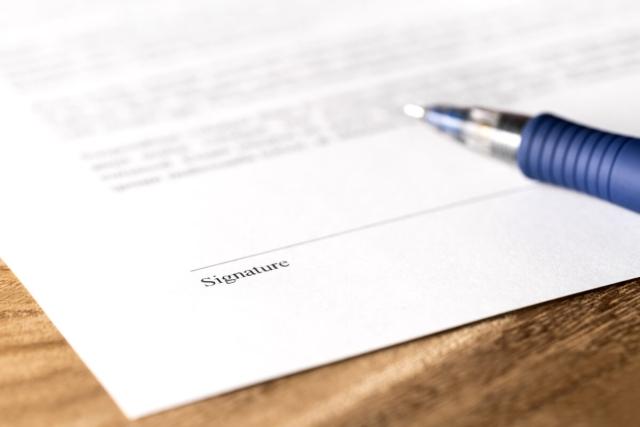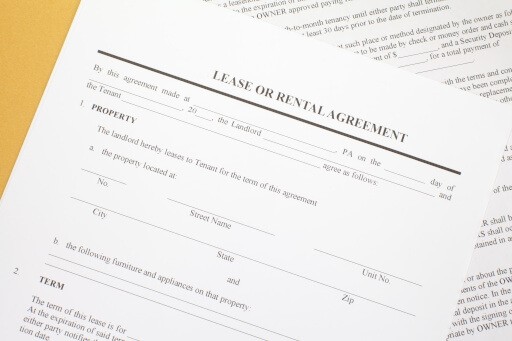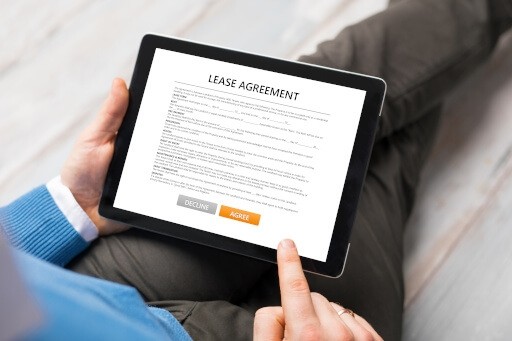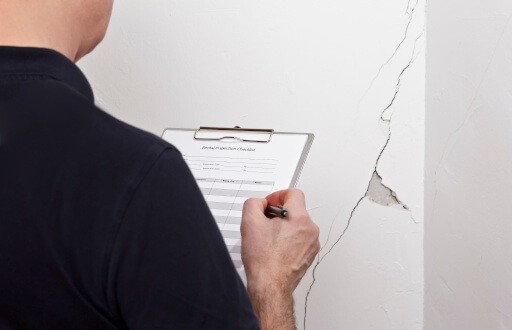
When a lease ends early, whether it’s your decision or your tenant’s, it can feel overwhelming. In this situation, your main worry will likely be maintaining your rental income through the end of the lease term. However, there is a simple and proactive way to combat this stress, and that is by including a buyout clause in your lease agreement.
In this article, we’ll explain how a buyout clause works and what landlords should know before implementing one in a lease agreement. Here’s a look at some of the questions we’ll answer:
- What is a buyout clause in a lease?
- What are the different types of buyout clauses?
- When should you use a lease buyout clause?
- What are the components of a lease buyout clause?
What Is a Lease Buyout Clause?
A lease buyout clause, which is one of many clauses you can include in a contract, is a provision that allows a tenant or landlord to prematurely end a lease by paying a predetermined fee. This fee compensates for potential financial loss and inconvenience of finding a new tenant or, in the tenant’s case, moving to a new place. This provides both parties financial protection in case of early lease termination, ensuring flexibility and peace of mind throughout the lease term.
Check out this buyout clause example to get a better understanding of how it works:
If [Tenant] intends to vacate the leased premises prior to the end of the lease term, they must provide written notice at least thirty (30) days in advance, submitted on or before the 1st day of the month in which they plan to move out. Additionally, [Tenant] is required to pay an early termination fee equivalent to two (2) months' rent. Upon receiving this payment and retaining the security deposit, the Landlord may, at their discretion, release [Tenant] from any future rental obligations under the lease.
In this example, the buyout clause allows the tenant to break their lease as long as they fulfill their obligations and pay the designated buyout fee. This provides a clear understanding of expectations and protects both parties from potential miscommunication down the line.
Types of Lease Buyout Clauses
The type of lease buyout you use will depend on your unique circumstances and needs. Here are three types for you to consider:
Lease buyout with notice and penalty
This is the most common type of buyout clause, as seen in the example above. It requires the party terminating the lease to provide written notice within a specific timeframe and pay a predetermined fee. This allows for flexibility and eliminates any confusion or disputes regarding early lease termination.
Lease buyout under a rent-responsible clause
This type of buyout clause allows you to require the tenant to continue paying rent until a new occupant takes over the lease. It safeguards you against financial losses caused by early termination and ensures a steady rental income. However, it may be difficult to enforce and perceived as unfair by tenants.
Lease buyout for military personnel
The Servicemembers Civil Relief Act grants active duty, deployed, or reassigned military personnel the right to terminate their lease through a buyout clause. As a landlord, you are legally obligated to honor this provision and cannot deny it. To exercise this right, the servicemember simply needs to provide written notice to their landlord.
When Should You Use a Lease Buyout Clause?
As a landlord, it’s important to remember that circumstances can change. While a rental property lease agreement is a contractually binding document, allowing some flexibility for unforeseen situations can lead to better outcomes for both parties. Keep in mind that an ethical and fair landlord is willing to work with their tenant to achieve the best outcome. Below, we outline scenarios where invoking a lease buyout clause may be the right approach.
Medical reasons
The most common reason for a lease buyout is medical-related issues. For example, a tenant may need to terminate their lease if they can no longer live independently or must transition to a nursing home or rehabilitation facility. In such cases, tenants are typically required to provide their landlord with documentation, such as a letter from a doctor or court, that verifies their situation. This letter should also include a “release” clause specifying when the lease can be officially terminated.
Personal protection and safety
A lease buyout is also warranted for personal protection and safety. Tenants experiencing the following unsafe situations may break their lease early without paying a penalty:
- Domestic violence
- Harassment
- Physical and sexual assault
- Stalking
In this situation, a tenant must provide a copy of their protection order, a written report from a law enforcement agency, and a written affidavit signed by an official third party verifying the victim’s abuse. Once they’ve provided these materials, they can move forward with the lease buyout.
Active duty or military deployment
As mentioned earlier, active duty and deployed military personnel are legally protected from any penalties associated with breaking a lease early. To successfully buy out of a lease, they can either send their landlord written notice, a letter from their commanding officer, or a copy of their military order. Additionally, the widow of an active military member who passes away while in service can break a lease early within a year of their spouse’s passing.
Property negligence
As a landlord, it’s your responsibility to provide and maintain a safe and habitable rental unit for your tenants, as outlined by your state laws. If you fail to do so, the tenant has grounds for breaking their lease early without facing any penalties. Examples of property negligence include:
- Mold and mildew outbreaks
- Insect or rodent infestation
- Plumbing issues causing poor water quality or leaks
- Lack of heating and cooling systems
- Ongoing, unresolved noise issues (neighbors partying late at night, etc.).
- Letting the property become virtually uninhabitable.
If a tenant experiences these types of problems and you don’t take appropriate action within a reasonable timeframe, they may be able to break their lease without penalty.
Property refurbishment
There may come a time when you decide to revamp and repurpose your rental property. Perhaps you plan to convert it into a bed and breakfast or a small boutique restaurant to boost profitability. In this situation, a buyout clause can help you regain possession of your property without having to wait for the lease term to end.
Self-occupation
Self-occupation is when a landlord decides to move back into their property. There are many reasons you might do this, like wanting to be closer to family or needing to save money. However, if you have a tenant already living in your rental property, you can’t just kick them to the curb before the lease expires. In this case, a buyout clause would help you break your current tenant’s lease without violating your rental agreement.
6 Things You Should Know About a Lease Buyout Clause
If you’re considering adding a buyout clause to your rental agreement, just know that it may be more complex than other lease components. That said, here are some key things to keep in mind when creating a lease buyout clause:
The notification timeline
A well-crafted and legally compliant lease buyout clause should clearly outline the required notification period. This specifies how far in advance a tenant must inform their landlord of their intent to terminate the lease early. While a 30-day notice (approximately four weeks) is the most common standard, requirements can vary. To avoid confusion, ensure the notification period is explicitly stated within the clause.
Reasonable notice and justification
No matter who is terminating the lease early, there should always be a valid reason for doing so. A tenant can’t just decide they don’t feel like paying rent anymore. Similarly, landlords must legally justify their reasons for terminating a lease before it ends. Your lease buyout clause should outline what warrants an early termination, such as military leave or medical reasons, along with required verification materials to support that claim.
Financial penalties
Aside from exceptions like military enlistment or personal safety issues, most lease buyout clauses include financial penalties, otherwise known as a buyout fee. In your buyout clause, explicitly outline the amount of money the landlord/tenant must pay to break the lease early. This fee can vary depending on factors like how many months are remaining in the lease, the type of property, and legal parameters based on your state.
Legal compliance
Before crafting your lease buyout clause, it’s essential to review local and state laws. Depending on where you live, your local government might have specific requirements dictating the lease buyout process. The more knowledgeable you are about these regulations, the better you can avoid getting yourself into legal trouble.
Potential negotiations
It’s important to remember that the lease buyout process is supposed to be a flexible and collaborative solution for you and your tenant. While you’ll have the ultimate say on the terms of the buyout clause, you should anticipate potential pushback from your tenant. For example, your tenant might negotiate a lower buyout fee or more time to vacate the property. Try your best to be open and flexible with your tenant throughout this process to find mutually beneficial solutions.
Alternative solutions
While buyout clauses provide a safety net for both landlords and tenants, there are other ways to handle early lease termination, including:
- Passing the lease to a new tenant
- Subleasing the rental property to a new tenant (if your state and local laws permit)
- Licensing a third party to use a specific part of the leased property
- Terminating by mutual consent
Being open to alternative solutions like those listed may save you and your tenant from a buyout scenario, which can potentially be expensive and time-consuming.
Create a Lease on Apartments.com
Now that you understand the basics of lease buyouts, let’s get started on your rental property lease agreement! Using Apartments.com’s user-friendly Lease Generator Tool, you can create a customizable and compliant lease agreement in minutes! Our platform allows you to tailor all parts of your lease agreement, including the buyout clause, to fit your specific needs. Not to mention, our lease agreements are state-specific and legally binding, meaning you can rest assured that your lease is compliant and enforceable in your area. Create your lease today with Apartments.com and enjoy flexibility, protection, and peace of mind that your rental business is on the right track.
This article was originally published on May 23, 2022.
Frequently Asked Questions
How does a buyout clause work?
A buyout clause in a rental lease allows a tenant or landlord to terminate their lease early by paying an agreed-upon fee, typically outlined in the lease agreement. This fee compensates the landlord or tenant for potential losses from the early termination.
What is an example of a buyout clause?
A buyout clause example is when a tenant can terminate their lease early by providing written notice at least 30 days in advance and paying an early termination fee equivalent to two months' rent.
Does the law require a buyout clause in a lease?
No, the law does not require a buyout clause in the lease. However, you should include one if you or your tenant need to terminate the lease early.
Is the buyout price on a lease negotiable?
Yes, the terms of a buyout clause can be negotiated between the landlord and tenant before signing the lease agreement. It's essential to agree on and clearly outline these terms in writing to avoid any confusion or disputes in the future.
What is a buyout fee?
The buyout fee is another name for the financial penalty that a tenant or landlord must pay to terminate the lease early. This amount is typically agreed upon and outlined in the lease agreement.
Is a buyout from a lease capital gain?
Yes, a buyout from a lease is a capital gain, and as such, it is taxable.











